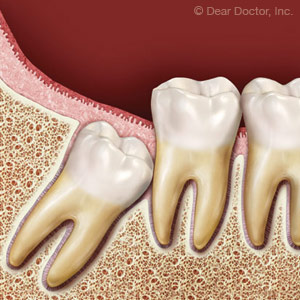Posts for tag: wisdom teeth

Once upon a time, celebrities tried hard to maintain the appearance of red-carpet glamour at all times. That meant keeping the more mundane aspects of their lives out of the spotlight: things like shopping, walking the dog and having oral surgery, for example.
That was then. Today, you can find plenty of celebs posting pictures from the dentist on social media. Take Julianne Hough, for example: In 2011 and 2013, she tweeted from the dental office. Then, not long ago, she shared a video taken after her wisdom teeth were removed in December 2016. In it, the 28-year-old actress and dancer cracked jokes and sang a loopy rendition of a Christmas carol, her mouth filled with gauze. Clearly, she was feeling relaxed and comfortable!
Lots of us enjoy seeing the human side of celebrities. But as dentists, we’re also glad when posts such as these help demystify a procedure that could be scary for some people.
Like having a root canal, the thought of extracting wisdom teeth (also called third molars) makes some folks shudder. Yet this routine procedure is performed more often than any other type of oral surgery. Why? Because wisdom teeth, which usually begin to erupt (emerge from beneath the gums) around age 17-25, have the potential to cause serious problems in the mouth. When these molars lack enough space to fully erupt in their normal positions, they are said to be “impacted.”
One potential problem with impacted wisdom teeth is crowding. Many people don’t have enough space in the jaw to accommodate another set of molars; when their wisdom teeth come in, other teeth can be damaged. Impacted wisdom teeth may also have an increased potential to cause periodontal disease, bacterial infection, and other issues.
Not all wisdom teeth need to be removed; after a complete examination, including x-rays and/or other diagnostic imaging, a recommendation will be made based on each individual’s situation. It may involve continued monitoring of the situation, orthodontics or extraction.
Wisdom tooth extraction is usually done right in the office, often with a type of anesthesia called “conscious sedation.” Here, the patient is able to breathe normally and respond to stimuli (such as verbal directions), but remains free from pain. For people who are especially apprehensive about dental procedures, anti-anxiety mediation may also be given. After the procedure, prescription or over-the-counter pain medication may be used for a few days. If you feel like singing a few bars, as Julianne did, it’s up to you.
If you would like more information about wisdom tooth extraction, please call our office to arrange a consultation. You can learn more in the Dear Doctor magazine articles “Wisdom Teeth” and “Removing Wisdom Teeth.”

When die-hard music fans hear that their favorite performer is canceling a gig, it’s a big disappointment—especially if the excuse seems less than earth-shaking. Recently, British pop sensation Dua Lipa needed to drop two dates from her world tour with Bruno Mars. However, she had a very good reason.
“I’ve been performing with an awful pain due to my wisdom teeth,” the singer tweeted, “and as advised by my dentist and oral surgeon I have had to have them imminently removed.”
The dental problem Lipa had to deal with, impacted wisdom teeth, is not uncommon in young adults. Also called third molars, wisdom teeth are the last teeth to erupt (emerge from beneath the gums), generally making their appearance between the ages of 18-24. But their debut can cause trouble: Many times, these teeth develop in a way that makes it impossible for them to erupt without negatively affecting the healthy teeth nearby. In this situation, the teeth are called “impacted.”
A number of issues can cause impacted wisdom teeth, including a tooth in an abnormal position, a lack of sufficient space in the jaw, or an obstruction that prevents proper emergence. The most common treatment for impaction is to extract (remove) one or more of the wisdom teeth. This is a routine in-office procedure that may be performed by general dentists or dental specialists.
It’s thought that perhaps 7 out of 10 people ages 20-30 have at least one impacted wisdom tooth. Some cause pain and need to be removed right away; however, this is not always the case. If a wisdom tooth is found to be impacted and is likely to result in future problems, it may be best to have it extracted before symptoms appear. Unfortunately, even with x-rays and other diagnostic tests, it isn’t always possible to predict exactly when—or if—the tooth will actually begin causing trouble. In some situations, the best option may be to carefully monitor the tooth at regular intervals and wait for a clearer sign of whether extraction is necessary.
So if you’re around the age when wisdom teeth are beginning to appear, make sure not to skip your routine dental appointments. That way, you might avoid emergency surgery when you’ve got other plans—like maybe your own world tour!
If you would like more information about wisdom tooth extraction, please call our office to arrange a consultation. You can learn more in the Dear Doctor magazine articles “Wisdom Teeth” and “Removing Wisdom Teeth.”

Via a recent Instagram post, pop diva Ariana Grande became the latest young celebrity to publicly acknowledge a dental milestone: having her wisdom teeth removed. The singer of hits such as “Break Free” and “Problem” posted an after-surgery picture of herself (wearing her signature cat-eye eyeliner), with a caption addressed to her teeth: “Peace out, final three wisdom teeth. It’s been real.”
With the post, Grande joined several other celebs (including Lily Allen, Paris Hilton and Emile Hirsch) who have shared their dental surgery experience with fans. Will "wisdom teeth removal" become a new trending topic on social media? We aren’t sure — but we can explain a bit about the procedure, and why many younger adults may need it.
Technically called the “third molars,” wisdom teeth usually begin to emerge from the gums between the ages of 17 and 25 — presumably, around the same time that a certain amount of wisdom emerges. Most people have four of these big molars, which are located all the way in the back of the mouth, on the left and right sides of the upper and lower jaws.
But when wisdom teeth begin to appear, there’s often a problem: Many people don’t have enough space in their jaws to accommodate them. When these molars lack sufficient space to fully erupt (emerge), they are said to be “impacted.” Impacted teeth can cause a number of serious problems: These may include pain, an increased potential for bacterial infections, periodontal disease, and even the formation of cysts (pockets of infection below the gum line), which can eventually lead to tooth and bone loss.
In most cases, the best treatment for impacted wisdom teeth is extraction (removal) of the problem teeth. Wisdom tooth extraction is a routine, in-office procedure that is usually performed under local anesthesia or “conscious sedation,” a type of anesthesia where the patient remains conscious (able to breathe normally and respond to stimuli), but is free from any pain or distress. Anti-anxiety medications may also be given, especially for those who are apprehensive about dental procedures.
So if you find you need your wisdom teeth extracted, don’t be afraid to “Break Free” like Ariana Grande did; whether you post the results on social media is entirely up to you. If you would like more information about wisdom tooth extraction, please call our office to schedule a consultation. You can learn more in the Dear Doctor magazine articles “Wisdom Teeth” and “Removing Wisdom Teeth.”

Teeth damaged by decay, periodontal (gum) disease or trauma are often removed (extracted) if they’re deemed beyond repair. But there’s another reason we may recommend an extraction: a tooth is causing or has the potential to cause problems for other teeth and your overall oral health.
Some of the most frequent cases of “preventive extraction” involve the third molars, or wisdom teeth, located in the very back of the mouth. They’re usually the last permanent teeth to come in, which is related to some of the problems they can cause. Because they’re trying to come in among teeth that have already erupted they don’t always erupt properly, often at abnormal angles or not fully erupting through the gums, a condition called impaction.
Impacted or misaligned wisdom teeth can put pressure on adjacent teeth and their roots, which can cause root resorption that damages the second molar. They can also increase the risk of periodontal (gum) disease in the gum tissues of the second molars, which if untreated can ultimately cause teeth and bone loss.
Because of current or possible future problems with wisdom teeth, we often consider removing them at some early point in the person’s dental development. Such a consideration shouldn’t be undertaken lightly, since wisdom teeth extraction is often complex and fraught with complications, and it usually requires a surgical procedure.
That’s why we first conduct a comprehensive examination (including x-ray or other imaging to determine exact location and possible complications) before we recommend an extraction. If after careful analysis an extraction appears to be the best course, we must then consider other factors like planned orthodontics to determine the best time for the procedure.
Once performed, a wisdom tooth extraction can resolve existing problems now and reduce the risks of gum disease or malocclusions in the future. When it comes to wisdom teeth, removing them may be in your or your family member’s best interest for optimal dental health.
If you would like more information on wisdom teeth, please contact us or schedule an appointment for a consultation. You can also learn more about this topic by reading the Dear Doctor magazine article “Wisdom Teeth.”

A few days before the Oscars, Vanity Fair magazine asked Academy Awards host Neil Patrick Harris to name his most treasured possession. Was it his Tony award statuette for best leading actor in a musical? His star on the Hollywood Walk of Fame? The stethoscope he wore while playing teenaged doctor Doogie Howser on TV? No, as it turns out, the 41-year-old actor’s most treasured possession is… his wisdom teeth. Yes, you read that correctly. “Oddly, I still have my four wisdom teeth,” Harris said. “I refuse to let them go or I’ll lose my wise parts.”
How odd is it for a 41-year-old to have wisdom teeth? Actually, not that odd at all. While it is true that wisdom teeth are often removed, there’s no one-size-fits-all approach to this. It all depends on whether they are causing problems now, or are likely to cause problems in the future.
The trouble wisdom teeth cause is related to the fact that they are the last molars to come in, and that molars are large in size. By the time wisdom teeth appear between the ages of 17 and 21, there often is not enough room for them in the jaw. Sometimes it’s because you may have inherited a jaw size that’s too small for your tooth size; and generally speaking, the size of the human jaw has evolved to become smaller over time.
If room is lacking, the adjacent molar (that came in earlier) can interfere with the path of eruption — causing the wisdom tooth to come in at an odd angle. The wisdom tooth can hit up against that other tooth, possibly causing pain or damaging the adjacent tooth. This is known as “impaction.” Sometimes the wisdom tooth breaks only partway through the gum tissue, leaving a space beneath the gum line that’s almost impossible to clean, causing infection. A serious oral infection can jeopardize the survival of teeth, and even spread to other parts of the body.
If a wisdom tooth is impacted, will you know it? Not necessarily. A tooth can be impacted without causing pain. But we can see the position of your wisdom teeth on a dental x-ray and help you make an informed decision as to whether they should stay or go. If removal is the best course of action, rest assured that this procedure is completely routine and that your comfort and safety is our highest priority. If there is no great risk to keeping them, as Neil Patrick Harris has done, we can simply continue to monitor their condition at your regular dental checkups. It will be particularly important to make sure you are reaching those teeth with your brush and floss, and that you keep to your schedule of regular professional cleanings at the dental office. All healthy teeth are indeed worth treasuring.
If you would like more information about wisdom teeth, please contact us or schedule an appointment for a consultation. You can learn more by reading the Dear Doctor magazine articles “Wisdom Teeth” and “Removing Wisdom Teeth.”
